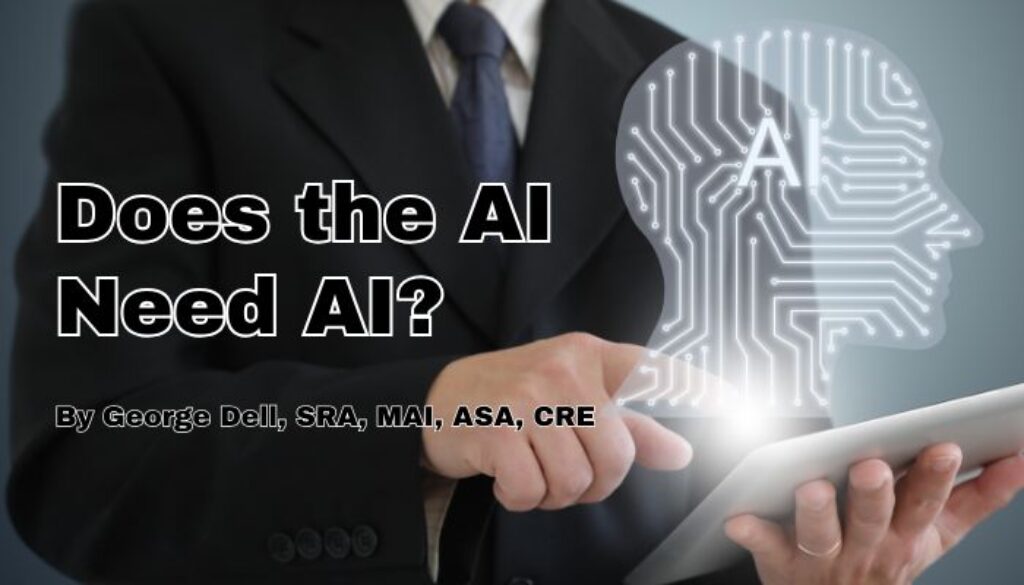Should the AI (Appraisal Institute) teach AI (Artificial Intelligence)?
This is Part 2 on the Series of the Appraisal Institute and Artificial Intelligence. Read Part 1 here.
AI tools, such as ChatGPT, depend on prior knowledge being published somewhere out there in the cloud. Somewhere.
The AI (the education provider) continues to emphasize the supremacy of judgement. Good, ol-fashioned judgement, just like I learned 30 years ago. The professional appraiser’s judgment. Best done by the “apex” appraiser, the MAI, and with less aplomb, the SRA.
The judgment is to follow the “appraisal process” now revised to the words “valuation process.” Regardless of the name change, the process requires seven distinct steps, and a reporting step. The seven official process “components” are:
- Identify the problem
- “Determine” scope of work
- Collect data and property description
- Data analysis
- Land value opinion
- Apply the “approaches” to value
- Reconcile indications of value to the final value opinion.
The unofficial process (especially for residential appraisals) is:
- Pick comps
- Make adjustments
For income properties, net income and speculative future value — rule the “make adjustments” part.
Judgment. Careful judgment.
So how does generative AI go about searching the cloud for ‘judgment.’ At best, if millions of judgment-based appraisals are available, it can attempt to simply mimic the opinions from millions of ‘similar’ appraisals. Kinda like appraising appraisal opinions – Pick similar appraisals, make adjustments.
So can we let the AI teach the AI? Compile judgment-based appraisals. Put’em in a pot, then develop algorithms to “average out” subjectivity. Might work. (Are our GSEs tending in this direction?)
Question 1 — might AI (cloud-based knowledge) work better if it builds on evidence-based valuation (EBV)©? (A data-centric approach instead of a judgment-centric approach.)
Question 2 – might the Appraisal Institute (the organization) do better if it promotes modern, data-centric valuation?
Question 3 – might artificial intelligence excel if built on facts and logic, instead of multiple opinions?
Answers to 1, 2, and 3: AI requires facts and logic. AI works best using all the available data, optimal data selection (not pick comps), and reliable, repeatable algorithms.
At Valuemetrics.info, we bring the tools and competence of data science to experienced appraisers.
The future is not a regurgitated, re-celebrated past! The future is not fear . . . It is bold. It is spirit. Now!
The future is an opportunity for the profession to truly serve the public good – with pride, satisfaction and respect of the service attitude.
The AI has lost its way in education. The leadership must learn to search, not sit on the past.
